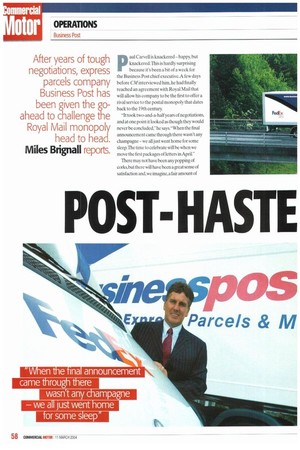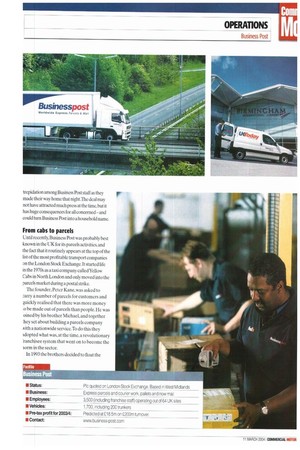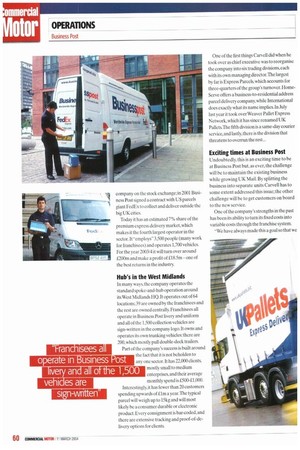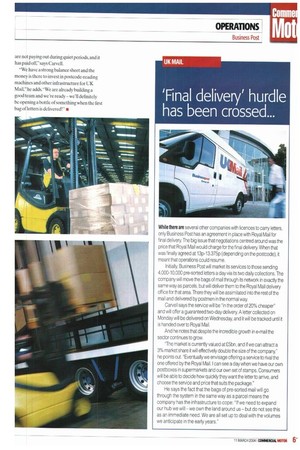POST-HASTE
Page 58

Page 59

Page 60

Page 61

If you've noticed an error in this article please click here to report it so we can fix it.
trepidation among Business Post staff as they made their way home that night.The deal may not have attracted much press at the time. but it has huge consequences for all concerned— and could turn Business Post into a household name.
From cabs to parcels
Until recently,Business Post was probably best known in the UK for its parcels activities, and the fact that it routinely appears at the top of the list of the most profitable transport companies on the London Stock Exchange. It started life in the 1970s as a taxi company called Yellow Cabs in North London and only moved into the parcels market during a postal strike.
The founder, Peter Kane, was asked to :arry a number of parcels for customers and quickly realised that there was more money .o be made out of parcels than people. He was oined by his brother Michael, and together :hey set about building a parcels company vith a nationwide service. To do this they idopted what was, at the time, a revolutionary 'ranchisee system that went on to become the iorm in the sector.
In 1993 the brothers decided to float the company on the stock exchange; in 2001 Business Post signed a contract with US parcels giant FedEx to collect and deliver outside the big UK cities.
Today it has an estimated 7% share of the premium express delivery market,which makes it the fourth largest operator in the sector. It "employs" 3.500 people (many work for franchisees) and operates 1,700 vehicles. For the year 2003/4 it will turn over around £200m and make a profit of £18.5m — one of the best returns in the industry.
Hub's in the West Midlands
In many ways, the company operates the standard spoke-and-hub operation around its West Midlands HQ. It operates out of 64 locations; 39 are owned by the franchisees and the rest are owned centrally. Franchisees all operate in Business Post livery and uniform and all of the 1,500 collection vehicles are sign-written in the company logo. It owns and operates its own trunking vehicles: there are 200, which mostly pull double-deck trailers.
Part of the company's success is built around the fact that it is not beholden to any one sector. It has 22,000 clients. mostly small to medium enterprises, and their average monthly spend is £500-£1.000.
Interestingly, it has fewer than 20 customers spending upwards of Lim a year.The typical parcel will weigh up to 15kg and will most likely be a consumer durable or electronic product. Every consignment is bar-coded, and there are extensive tracking and proof-of-delivery options for clients. One of the first things Carvell did when he took over as chief executive was to reorganise the company into six trading divisions, each with its own managing director.The largest by far is Express Parcels, which accounts for three-quarters of the group's turnover. HomeServe offers a business-to-residential address parcel delivery company, while International does exactly what its name implies. In July last year it took over Weaver Pallet Express Network, which it has since renamed UK Pallets.The fifth division is a same-day courier service, and lastly, there is the division that threatens to overrun the rest...
Exciting times at Business Post
Undoubtedly, this is an exciting time to he at Business Post but, as ever, the challenge will be to maintain the existing business while growing UK Mail. By splitting the business into separate units Carvell has to some extent addressed this issue; the other challenge will be to get customers on board to the new service.
One of the company's strengths in the past has been its ability to turn its fixed costs into variable costs through the franchise system.
"We have always made this a goal so that we are not paying out during quiet periods, and it has paid off," says Carvell.
"We have a strong balance sheet and the money is there to invest in postcode-reading machines and other infrastructure for UK Mail," he adds."We are already building a good team and we're ready —we'll definitely be opening a bottle of something when the first bag of letters is delivered!" w While there are several other companies with licences to carry letters, only Business Post has an agreement in place with Royal Mail for final delivery The big issue that negotiations centred around was the price that Royal Mail would charge for the final delivery. When that was finally agreed at 13p-13.375p (depending on the postcode), it meant that operations could resume.
Initially. Business Post will market its services to those sending 4.000-10,000 pre-sorted letters a day via its two daily collections. The company will move the bags of mail through its network in exactly the same way as parcels, but will deliver them to the Royal Mail delivery office for that area. There they will be assimilated into the rest of the mail and delivered by postmen in the normal way.
Carvell says the service will be "in the order of 20% cheaper" and will offer a guaranteed two-day delivery. A letter collected on Monday will be delivered on Wednesday, and ft will be tracked until it is handed over to Royal Mail.
And he notes that despite the incredible growth in e-mail the sector continues to grow.
The market is currently valued at £5bn, and if we can attract a 3% market share it will effectively double the size of the company" he points out. "Eventually we envisage offering a service to rival the one offered by the Royal Mail. I can see a day when we have our own postboxes in supermarkets and our own set of stamps. Consumers will be able to decide how quickly they want the letter to arrive, and choose the service and price that suits the package."
He says the fact that the bags of pre-sorted mail will go through the system in the same way as a parcel means the company has the infrastructure to cope: If we need to expand our hub we will-we own the land around us but do not see this as an immediate need. We are all set up to deal with the volumes we anticipate in the early years."
































































































































































































